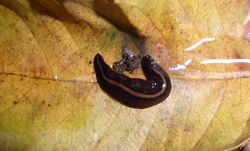Biology:Paraba
From HandWiki
Short description: Genus of flatworms
| Paraba | |
|---|---|

| |
| Paraba multicolor | |
| Scientific classification | |
| Domain: | Eukaryota |
| Kingdom: | Animalia |
| Phylum: | Platyhelminthes |
| Order: | Tricladida |
| Family: | Geoplanidae |
| Subfamily: | Geoplaninae |
| Genus: | Paraba Carbayo et al., 2013 |
| Type species | |
| Geoplana multicolor Graff, 1899
| |
Paraba is a genus of land planarians from South America.
Description
Species of the genus Paraba have a slender body with nearly parallel margins while creeping. The largest specimens may reach about 8 cm in length. Both sides of the body are slightly convex. The pharynx is cylindrical and the prostatic vesicle is extrabulbar. The copulatory apparatus has a permanent, protrusible, conical penis occupying the entire male cavity, which is unfolded, and the female cavity is rounded and filled with a multilayered epithelium.[1]
Etymology
Paraba means multicolored in the Tupi language and alludes to the name of the type-species, Paraba multicolor.
Species
The following species are recognised in the genus Paraba:
- Paraba aurantia Marques & Leal-Zanchet, 2022[2]
- Paraba bresslaui (Schirch, 1929)[3]
- Paraba caapora (Froehlich, 1958)
- Paraba cassula (E. M. Froehlich, 1955)
- Paraba franciscana (Leal-Zanchet & Carbayo, 2001)
- Paraba gaucha (Froehlich, 1959)
- Paraba goettei (Schirch, 1929)
- Paraba hortulana Rossi & Leal-Zanchet, 2023[4]
- Paraba iguassuensis Peres, Rossi & Leal-Zanchet, 2020[5]
- Paraba incognita (Riester, 1938)
- Paraba multicolor (Graff, 1899)
- Paraba pankaru Amaral & Leal-Zanchet, 2019
- Paraba phocaica (Marcus, 1951)
- Paraba piriana (Almeida & Carbayo, 2012)
- Paraba preta (Riester, 1938)
- Paraba pseudogaucha Rossi & Leal-Zanchet, 2023[4]
- Paraba rubidolineata (Baptista & Leal-Zanchet, 2005)
- Paraba smaragdina Rossi, Negrete & Leal-Zanchet, 2020[5]
- Paraba suva (Froehlich, 1959)
- Paraba tapira (Froehlich, 1958)
- Paraba tata Bolonhezi, Lago-Barcia & Carbayo, 2020
- Paraba tingauna (Kishimoto & Carbayo, 2012)
- Paraba viricornuta Rossi & Leal-Zanchet, 2023[4]
References
- ↑ Carbayo, F.; Álvarez-Presas, M.; Olivares, C. U. T.; Marques, F. P. L.; Froehlich, E. X. M.; Riutort, M. (2013). "Molecular phylogeny of Geoplaninae (Platyhelminthes) challenges current classification: Proposal of taxonomic actions". Zoologica Scripta 42 (5): 508. doi:10.1111/zsc.12019.
- ↑ Marques, Alessandro Damasceno; Hartmann, Alef; Valiati, Victor Hugo; Leal-Zanchet, Ana Maria (9 November 2022). "Two new land planarian species (Platyhelminthes: Tricladida) from the Cerrado biome in southwestern Brazil". Zootaxa 5205 (4): 301–330. doi:10.11646/zootaxa.5205.4.1. ISSN 1175-5326.
- ↑ Silva, Marcos Santos; Carbayo, Fernando (10 February 2020). "X-ray microcomputed tomography applied to the taxonomic study of rare material: redescriptions of seven of Schirch's Brazilian species of land planarians (Geoplanidae, Platyhelminthes)". ZooKeys (910): 1–42. doi:10.3897/zookeys.910.39486. ISSN 1313-2989. PMID 32099514.
- ↑ 4.0 4.1 4.2 Rossi, Ilana; Leal-Zanchet, Ana Maria (2023). "Hidden diversity under stripes: three new species of land flatworms of the genus Paraba (Platyhelminthes: Geoplanidae) from the southern Atlantic forest". Studies on Neotropical Fauna and Environment. doi:10.1080/01650521.2023.2278220.
- ↑ 5.0 5.1 Rossi, Ilana; Peres, Jéssica Cardoso; Negrete, Lisandro; Leal-Zanchet, Ana (September 2020). "Increasing the species diversity of the genus Paraba (Platyhelminthes) with the description of two new species from the southern atlantic forest". Zoologischer Anzeiger 288: 11–23. doi:10.1016/j.jcz.2020.06.003. ISSN 0044-5231.
Wikidata ☰ Q18386539 entry
 |

